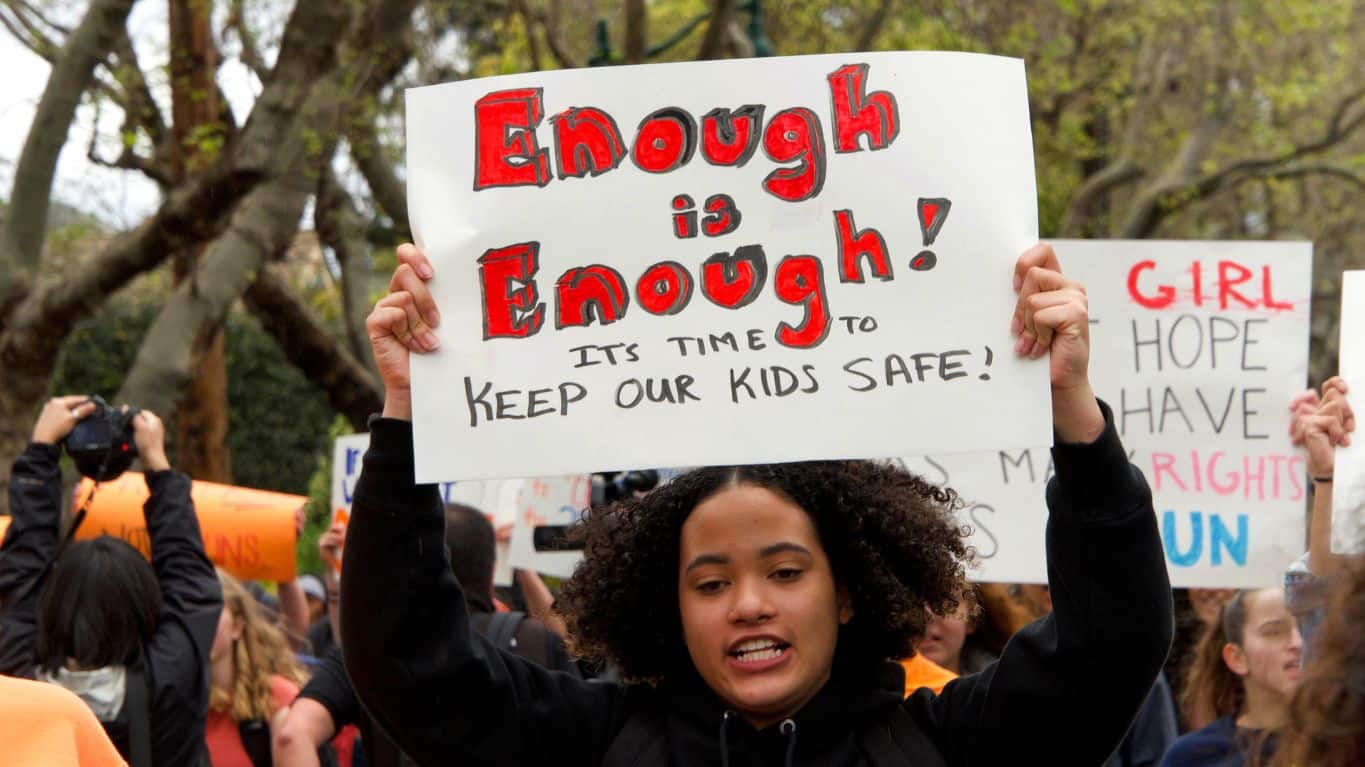As of this writing, there have been at least 150 mass shootings and 106 school shootings in the U.S. during 2023 alone. Considering that it’s still early in the year, those numbers are staggering.
Unfortunately, shootings have become a frequent occurrence in America, so it’s really important that you talk to your child about gun violence. Children need to learn how to deal with hearing about all these shootings in the news as well as learn how to manage their mental health.
It can be an extremely difficult subject to bring up with your child, but there are ways to discuss this important topic in way that will keep your child informed but not frighten them.
Deal With Your Emotions First
Kids are smart and also really tuned into your mood and energy. If you just heard about another shooting and are really upset or scared, your child is going to pick up on that and feel upset and scared too. It’s important to be calm when having this discussion.
Before discussing gun violence or a recent shooting with your child, talk to friends or family to vent and let out any emotions you might have about it. That way, once you’re ready to have a conversation with your kid, you’ll feel calmer but still honest and open about how you feel and what has happened.
Keep It Age Appropriate
For younger kids, keep the information very simple and don’t go into too much detail. Ask your young child what they know first and ask if they have any questions. You can answer any questions they have and reassure them that you are doing everything you can to make sure they stay safe.
To teach your younger child about gun violence, you can say something like “Sometimes, people use guns to hurt others, and it’s not okay. But there are people who are working to keep us safe and protect us.”
Try to keep your younger child away from the news so that they don’t see any disturbing images or hear anything that may scare them.
Older kids are able to handle more details about shootings and can learn about the warning signs, but still try to keep them away from graphic details and images. Just like when speaking to younger kids, start by asking your older child what they know and encourage them to ask you questions. Don’t worry if you can’t answer some of your child’s questions. Just be open and honest with them.
Ideally, it’s best to start the conversation about gun violence before your child hears about a shooting. That way, they feel more mentally prepared once they do hear about another shooting in the news. You can show your child videos like this one where kids talk to a survivor of a school shooting.
If your child has already heard about a shooting, you can still talk to them about what they know and answer their questions. This should be an ongoing conversation that will unfortunately come up every time there’s another shooting on the news.
Check In
Make it a habit of regularly checking in with your child and asking about how they’re feeling. There isn’t a set number of times you should ask them in a week since it depends on your child and your relationship with them. Listen to your instincts and ask them when it feels right to.
Model mental health self care by telling your kid how you’re feeling and being honest with them about your emotions. Encouraging your child to make a habit of discussing their feelings with you will make it more likely that they come to you if something is truly wrong. Remind them that they can always come to you no matter what and they do not need to be afraid of getting punished or disappointing you.
Talk About the Warning Signs
A non-profit organization that was started by some of the families of the Sandy Hook shooting victims, Sandy Hook Promise, has a list of “10 Critical Warning Signs of Violence” that would be useful for your family to read. Encourage your child to tell you immediately if they notice someone exhibiting these warning signs. If you see those warning signs in your child, then you need to get help for them as soon as possible.
Another thing you can do is encourage your child to talk to loners at school. They don’t have to be BFFs with them if they don’t want to, but they can smile at them from time to time and say “hi.” This little bit of compassion can go a long way.

Loners can be stigmatized and labeled as potential shooters just because they prefer being alone or don’t have the best social skills. Teach your child that not every quiet or introverted child is a potential school shooter, and most of them are harmless. It’s important to be nice and compassionate towards everyone, especially people who have a hard time making friends.
Also, encourage your child to immediately report any bullying they witness or experience.
Focus on the Heroes and the Positives
When a shooting gets media attention, different news outlets tend to focus on the shooter and all the horrific things that happened. You can balance out all the negativity on the news by highlighting the heroes in the story. Was there a teacher who kept their students safe? Are survivors of a school shooting now anti-gun violence activists? Show the positive ways people have fought back against the shooter and have tried to change the laws to keep people safe.
Get Your Child Help If They Need It
If you notice that your child is having problems with their mental health, it’s best to get them professional help as soon as possible. Sometimes, your child will need to see several therapists before they find one they connect to and feel comfortable with, so if your child does not like the first one they see, keep trying different ones until they find a therapist they connect to.
It’s unfortunate that you have to have this conversation with your child, but it’s the reality we live in. By being honest with your child about gun violence, encouraging them to share their feelings, and showing them that you love them and care about them, you can help them work through difficult emotions that will come up when yet another shooting is reported on the news.










Add comment